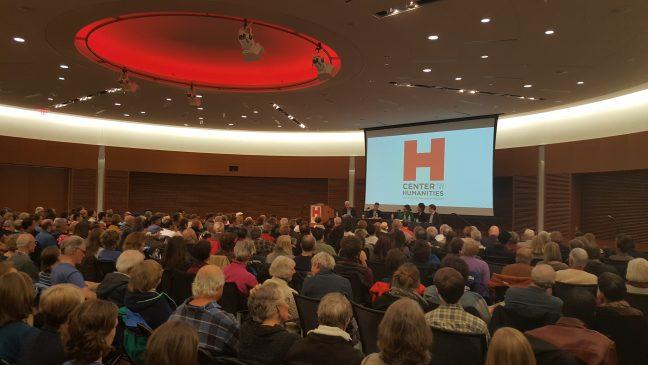If the large crowd at the University of Wisconsin Center for the Humanities’ event Thursday evening was any indication, many people were left with lots of questions following the results of the 2016 election.
Three weeks after the Nov. 8 elections, the Center hosted a panel of experts in the humanities building to make sense of the outcomes in the H.F. DeLuca Forum at the Wisconsin Institute for Discovery. Entitled “What We Know, What We Missed, What’s Next: Making Sense of the 2016 Election,” the panel comprised of four individuals from the fields of sociology, journalism and history.
Moderated by Steve Paulson, executive producer of Wisconsin Public Radio’s “To the Best of Our Knowledge,” the panel weaved through topics like election coverage by the news media and the role identity played in the election.
Trump, Johnson sweep Wisconsin in historic night for Republicans
Katherine Cramer, UW political scientist and author “The Politics of Resentment: Rural Consciousness in Wisconsin and the Rise of Scott Walker,” said she returned home on election night well aware the following day was going to be spent taking questions from journalists about the surprise election results.
“About 10 p.m. I started getting emails from national media outlets saying ‘Umm, can we talk to you because there’s something going on and we clearly missed it. Could we ask you a few questions?'”
Cramer said the amount and kinds of questions she’s received following the election have raised a red flag.
The mainstream media, Cramer asserted, is out of touch with life in Wisconsin. As an example, Cramer noted how many reporters have contacted her asking how active the Ku Klux Klan is in Wisconsin.
“Well, you can look and see that yes indeed we have hate groups in Wisconsin,” Cramer said.”But that’s not the story here. The story’s not that there’s racism here in Wisconsin or in so-called ‘flyover land’ … the truth is much more disturbing. The truth is that racism is so much a part of the fabric of our society, as it is on the East coast, the West coast, that you don’t have to be a card carrying member of the KKK to support Donald Trump.”
As for identity politics, there was no clear consensus on how the country might re-imagine it following the election results.
As noted by Sergio Gonzalez, a graduate student in UW’s history department, polls following the election indicated certain groups of people voted differently than expected.
“I think one of the things that the Clinton campaign took for granted was the Latino vote turning out against this anti-immigrant rhetoric,” Gonzalez said. “If you looked specifically at Florida, Cuban Americans voted 57 percent for Trump. However, if we look at Wisconsin, 90 percent of Mexican Americans voted for Hillary Rodham Clinton.”
This was because, as Gonzalez noted, the concept of identity is more nuanced than it may seem. Going forward, he suggested political scientists be more particular in their labeling of groups and more careful about the assumptions they make concerning those communities.
Alta Charo, a UW professor of law and bioethics, argued an environment has emerged where every group seems to view itself as a victim.
Charo said she has found some of the most pro-life and traditional individuals to see themselves as victims.
“[They feel like they’re] under siege of an increasingly secular culture that celebrates things that they find to be immoral in television and in movies,” Charo said.
At the same time, she noted people who support reproductive rights and gay marriage also see themselves as victims. Individuals may feel like victims not strictly for economic reasons, Charo explained, but because they feel like the kind of world they grew up thinking they were entitled to is slipping away.
Charo said she hopes the country can get beyond this sense of victimization and instead look for the systems and pressures producing this kind of environment in the first place.
To do this, Lucas Graves, an assistant professor in the school of journalism and mass communication said he thinks we will see an uptick of reporters stationed in middle America.
While Graves said any attempt to understand the heartland is likely to be well-intentioned, he raised concern about the relocation of journalists to the heartland.
“That scares me,” he said. “It’s really difficult to know what that means and what that should look like. How do you produce a journalism that is true to the life experience of people when those people have actually been excluded from the political process in ways that matter?”
The last thing he wants to see is some sort of journalism that exoticizes the middle of the country.
Journalism doesn’t operate in isolation, Graves said. It exists in tension with political policy and discourse, each shaping the other. And just as much as the need for journalists to pay attention to these issues, Graves emphasized the need for politicians to pay attention to these same issues as well.
“One of the best ways that I can imagine journalists covering the heartland is by covering politicians who are beginning to address the economic issues and the social issues of these constituencies,” he said.













